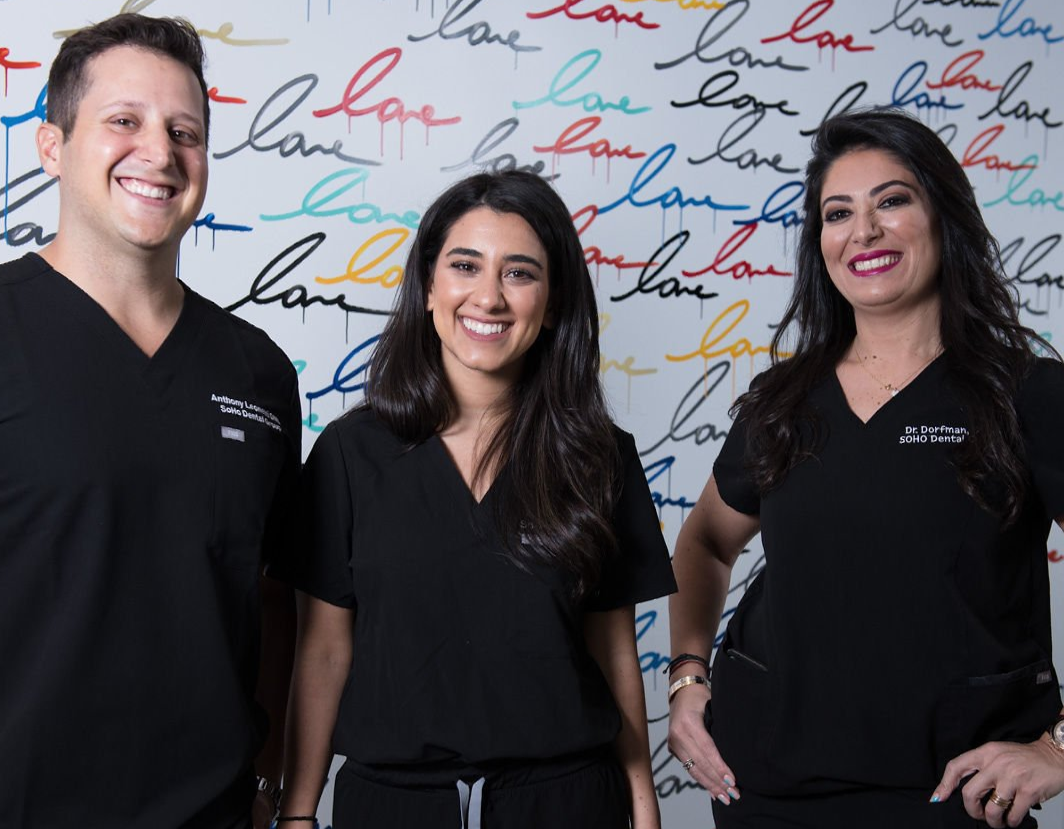Frequently Asked Questions
Regards Invisalign
-
What dental issues does Invisalign address?
- Crowded teeth (just not enough room)
- Misaligned teeth (crooked teeth)
- Overbite (upper teeth close down in front of lower teeth)
- Underbite (lower teeth protrude beyond upper teeth)
- Crossbite (upper and lower jaws don’t line up)
- Open bite (Top and bottom teeth don’t meet in the front)
- Gap teeth (spaces between teeth)
-
What’s it like to wear Invisalign aligners?
When you get your first aligners, wearing them may take a little while to get used to. You will remove them to eat, drink and clean your teeth and otherwise wear them around the clock (even while sleeping). It may also take a little time to get used to the feel of them in your mouth while you are talking, but you will probably adjust to this quickly. When you shift to a new aligner after one or two weeks, you may feel some pressure on your teeth for the first few days. The big benefit is not having to have all the wires and brackets in your mouth like with metal braces. When you have worked your way through all the aligners, you will need to wear a retainer to maintain all these improvements, just like with metal braces. But in this case, the retainer will be essentially invisible, just like the aligners.
-
How long does treatment take?
The answer to this question depends, of course, on how much your teeth need to move to reach their ideal positions. In some cases, it might just be a few months. In really severe cases, treatment time could reach 18 months. Nine to 15 months is a more typical time span. Fortunately, it is easy for you to find out your expected treatment time because of our consultation offer. We will perform an examination, take x-rays if they are needed and provide a consultation with the dentist on a treatment plan designed just for you.
-
What foods and drinks am I allowed to have?
You’ll always remove the aligners while eating or when drinking dark-colored beverages like coffee, wine, tea or juice. Colored foods can discolor the clear aligners. Feel free to drink clean, fresh water any time. It’s not advisable to drink hot beverages of any color because the heat can damage these trays. Just remove the aligners and enjoy your drink. If you drink a sugared drink, it’s advisable to rinse your mouth thoroughly afterwards so no sugar remains trapped between your teeth and the trays.
-
What’s the best way to clean Invisalign aligners?
When you brush and floss your teeth each day, gently brush your trays with lukewarm water and your usual toothpaste before replacing them in your mouth.
-
What is the difference between Invisalign and other clear aligners?
Invisalign has many years of experience in the field, their aligners have a better fit and are generally clearer. Most importantly, the treatment is followed by a dentist that will make sure the treatment is going well, and the bite is being corrected.
-
How much experience does Dr. Dorfman have with Invisalign?
Dr. Dorfman has been an Invisalign provider for over a decade, she has completed over 5000 cases, and is one of Invisalign’s top providers in the city. Dr. Dorfman reviews all the cases that are submitted into Invisalign from all our locations, and makes sure they are set up properly.
Regards Dental Implants
-
Am I a good candidate for dental implants?
You may be a good candidate if you are in good health and if your teeth and gums are in good condition. If it has not been long since you lost your teeth, you are more likely to have sufficient bone to support implants. The best way to determine your suitability for implants is to contact us for a free consultation complete with examination and x-rays. Look below for more information on this offer.
-
How long will this procedure take to complete?
Because the titanium implant must bond fully with the bone in your jaw, this procedure is normally completed in steps over a period of time that typically lasts three to six months or longer.
-
Are implants removable?
No, they are permanently placed in the bone of the upper or lower jaw. The ceramic replacement teeth (referred to as crowns) can be replaced if a problem arises.
-
Is there a metal-free implant?
Not at this time. Titanium is used for implants because it has proven so compatible with human tissue. Knee, shoulder and hip replacements routinely employ titanium parts that bond well with human bone.
-
What is the success rate of dental implants?
For a person in good overall health who cares for his or her teeth and gums properly, the success rate is 90% or better. Your doctor can discuss any improvements you might need to make in your health to give your implants the very best chance of success.
-
Why are dental implants better than other methods of tooth replacement?
Patients who have had unsatisfactory experiences with bridges, partial dentures or complete dentures are extremely happy when their dental implants are complete. They can eat just like they did before they lost any teeth. Their replacement teeth are secure and look just like their natural teeth. There is a high rate of success. And care of dental implants is the same as care of your natural teeth. Dental implants are a significant improvement over other methods of tooth replacement for the patient who is a good candidate for this treatment.
-
Are there any disadvantages to dental implants?
Not every person can utilize this treatment. If a person has lost a significant amount of bone mass in either jaw, there may not be enough bone present to support an implant. However, even this obstacle can be overcome with bone grafting. Bone grafting, a service of ours, is a procedure to strengthen, thicken and build up bone in the jaw bone. First, natural or synthetic bone grafting material is placed in the area of thin bone and then the area is allowed to heal. When the bone is fully healed, an x-ray will show if this area is now ready for a dental implant.
Regards Insurance & Financing
-
What Will Your Insurance Cover?
Of course, we won’t know exactly what your insurance will cover until we have your insurance information and call your provider. We will do our best to clarify your coverage so you can proceed with your recommended treatment as soon as possible. Please call us with your insurance information so we can confirm coverage for the care you need.
-
Will Your Insurance Cover Invisalign Treatment?
Has your dentist recommended Invisalign orthodontic treatment to correct the alignment of your teeth? While Invisalign is an excellent system to bring your teeth into alignment, some insurance plans have no coverage for orthodontia. Others will only cover part of the cost of Invisalign treatment. Because we know how important correctly aligned teeth are for both the health of your teeth and an attractive appearance, we frequently make special offers on Invisalign treatment available to our patients. Please call for more information on offers that are currently available to you.
-
Will Your Insurance Cover Cosmetic Dental Procedures?
Most dental insurance plans do not include coverage for cosmetic procedures such as whitening and other popular treatments. Please ask us about our financing choices that may help you get started immediately on that beautiful new smile.
Do you have other questions about financing your dental care? We know that financing and insurance can be confusing. Please call our office and let us help you work out how to obtain treatment for yourself or a family member.
$150 NEW PATIENT OFFER
NP Offer FAQs page form
We will get back to you as soon as possible.
Please try again later.


